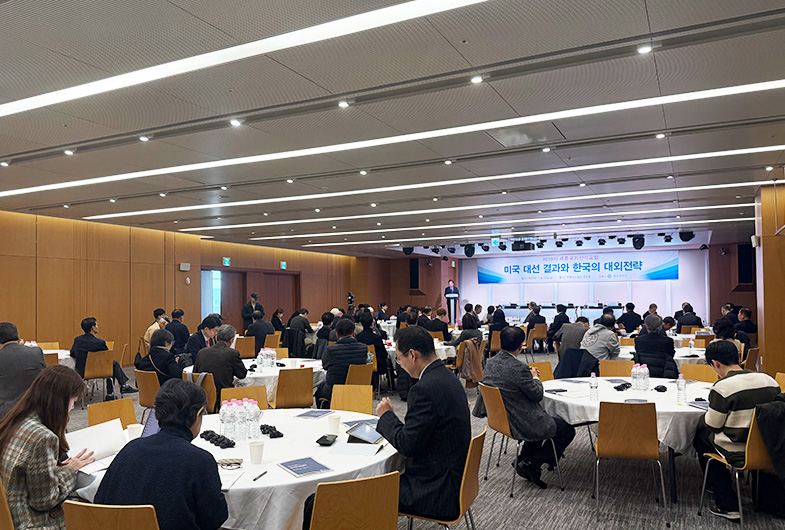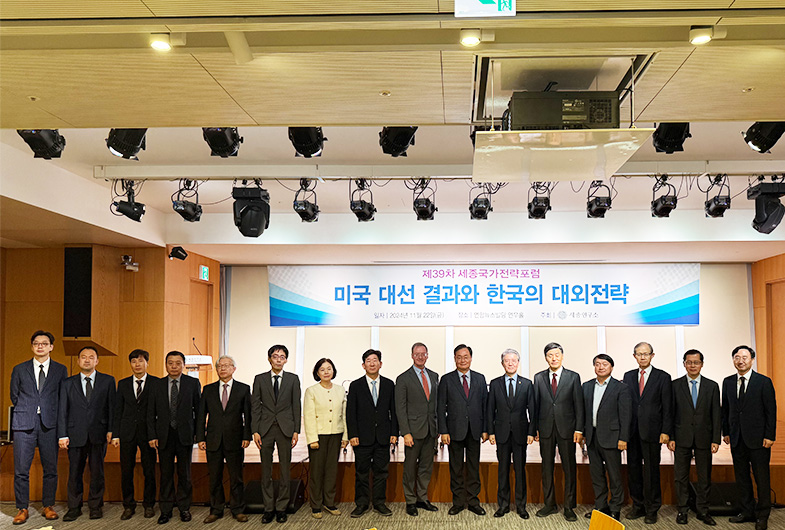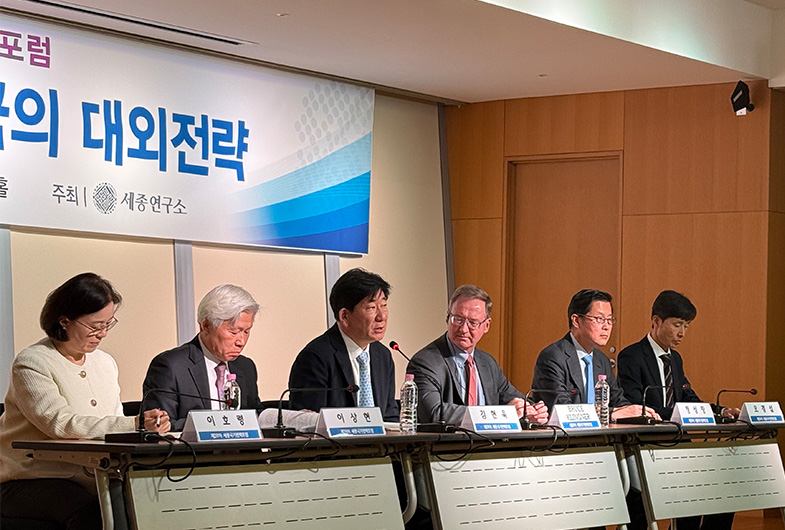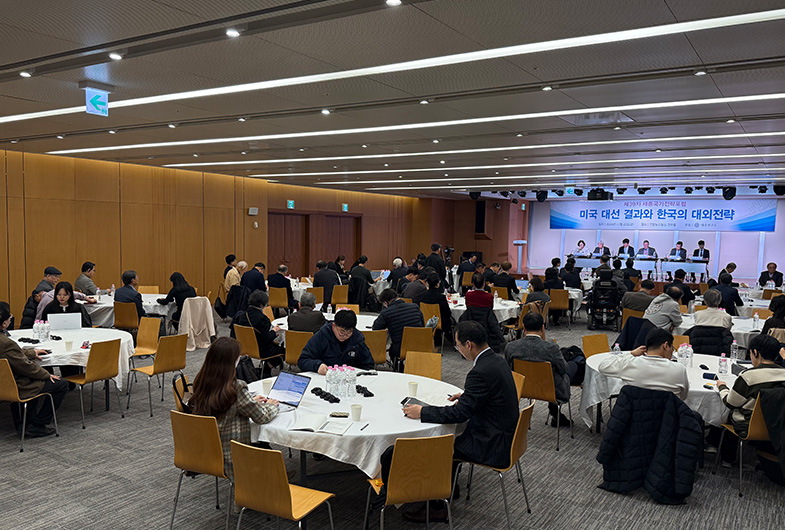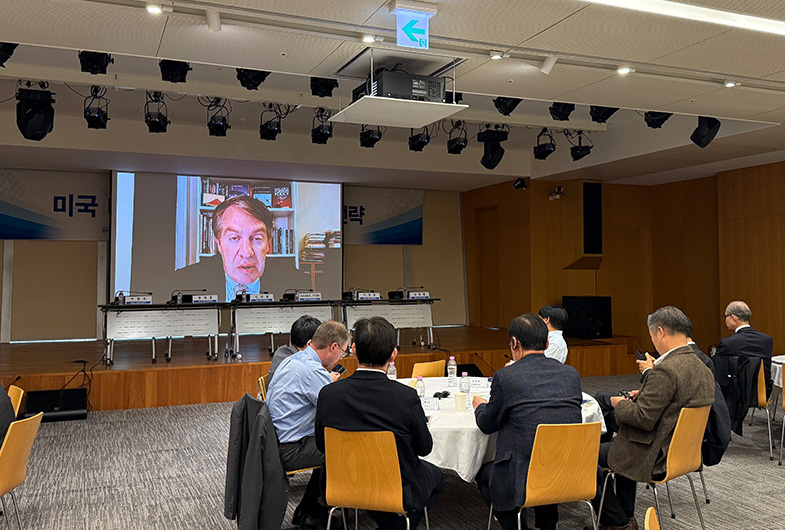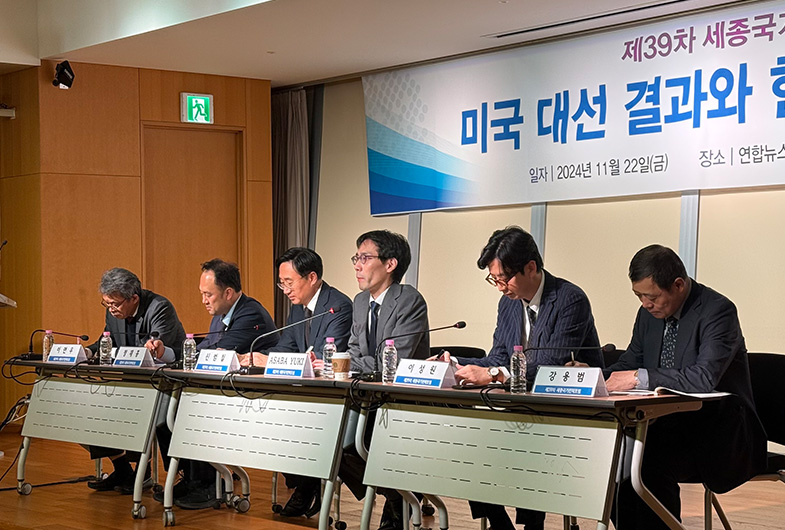The Sejong Institute (Chairman Yong-Joon Lee) held the 39th Sejong National Strategy Forum on November 22 (Friday) at 10 a.m. in Yeonwoo Hall on the 17th floor of the Yonhap News Building, with over 100 attendees. The forum's theme was "The U.S. Election Results and Korea’s Foreign Strategy."
□ At the opening ceremony, Yong-Joon Lee, Chairman of the Sejong Institute, pointed out that "The outcome of the U.S. presidential election will bring a new wave to the international community and pose a significant challenge to Korea's future." He emphasized that issues such as "Ukraine, Israel, and Taiwan" would be more direct and severe. Hyun-wook Kim, President of the Sejong Institute, stated, "If U.S.-China competition accelerates, South Korea will face severe economic losses and security challenges. Moreover, if nuclear disarmament negotiations occur between North Korea and the U.S., the opinion supporting nuclear armament in South Korea is expected to rise."
□ Hong-kyun Kim, First Vice Minister of Foreign Affairs (Keynote Speech), stated, "We will strengthen practical cooperation in areas such as shipbuilding, in close coordination with the Trump administration, and further enhance the South Korea-U.S. alliance." He also emphasized, "We will consider various measures to respond firmly to North Korea's provocations and threats, while closely monitoring the growing ties between North Korea and Russia."
- With the new administration in the U.S. taking office under the banner of "America First," it is expected that international order based on values and norms, as well as cooperation with allied nations, will weaken. The South Korean government's national security strategy, under President Yoon, focuses on a pragmatic diplomacy prioritizing national interests and balancing it with value-based diplomacy. The foreign policy direction expected from the new U.S. administration closely aligns with the South Korean government's approach in several aspects.
- It is noteworthy that during the phone call between the South Korean president and President-elect Trump on the 7th, Trump emphasized the need for cooperation in the shipbuilding sector, specifically mentioning maintenance, repair, and overhaul (MRO) capabilities. This indicates a growing need for cooperation with South Korea, the number one shipbuilding power in the liberal democratic camp, as China's naval power increases in the context of the escalating U.S.-China strategic competition. The Ministry of Foreign Affairs views this as an opportunity to expand common ground with the new U.S. administration, solidifying and strengthening the South Korea-U.S. alliance.
- While promoting the development of the South Korea-U.S. alliance, it is equally crucial to strategically manage relationships with countries that differ ideologically and politically, in order to realize the vision of a free, peaceful, and prosperous Korean Peninsula. In particular, managing relations with China is essential for South Korea.
The government will review various countermeasures against the military ties between Russia and North Korea, which threaten South Korea’s core security interests, and will respond firmly to North Korea's provocations and threats in cooperation with the international community.
□ Bruce Klingner, Senior Research Fellow at The Heritage Foundation, emphasized that "South Korea’s focus on strengthening regional security in response to the growing Chinese threat is a better approach to dealing with the Trump administration" and pointed out, "We cannot simply stand by in the event of a Taiwan contingency."
- The second term of the Trump administration will implement policies more efficiently than the first term. Various organizations, including Trump’s campaign and think tanks, are working energetically to quickly fill second-term appointments, prepare extensive policy recommendations, develop training programs for newly appointed officials, and prepare documents for early presidential signatures.
- Emphasizing South Korea's significant contribution to defense and its efforts to strengthen regional security in response to the growing Chinese threat is a better way to approach Trump’s view of alliances as transactional relationships and his stance of seeking benefits through U.S. military deployments abroad. While South Korea has been hesitant to take a decisive role in a potential Taiwan Strait crisis, given that China’s threat is a priority in U.S. strategic thinking, South Korea cannot afford to simply watch in the event of a Taiwan contingency.
□ Scott Snyder, Director of the Korea-U.S. Economic Institute, stated, "If a South Korea-U.S.-Japan summit is held quickly at Mar-a-Lago and the Camp David process is rebranded as the Mar-a-Lago process, President Trump will be a strong supporter of trilateral cooperation."
- President Trump will pursue a "Trump-centric" foreign policy, rather than an isolationist one, and will assert leadership that commands the international community's focus. There is concern that President Trump might disrupt the South Korea-U.S.-Japan cooperation process, which began under President Biden’s administration at Camp David. Therefore, if a South Korea-U.S.-Japan summit is held soon after his inauguration at Mar-a-Lago and the Camp David process is rebranded as the Mar-a-Lago process, it will greatly help President Trump become a strong advocate for trilateral cooperation.
- Among South Korean investors, there is an expectation that certain bills developed during the Biden administration, such as the Inflation Reduction Act and the CHIPS Act, may be adjusted, but Republican lawmakers may continue to push them under the "America First" approach, rather than completely eliminating them. However, since products made in the U.S. from South Korean investments are regarded as U.S. products, South Korea is already in a relatively advantageous position.
#1. Session 1: "U.S. Election Results and the South Korea-U.S. Alliance" Key Presentations
□ Sang Hyun Lee, Principal Fellow at the Sejong Institute: "Outlook on the U.S. New Administration’s Foreign Policy and the Situation on the Korean Peninsula"
- South Korea must prepare for the uncertainties and risks in the South Korea-U.S. relationship that may arise from a second Trump administration. The immediate issues include defense cost-sharing, the risks of direct nuclear threats or negotiations between the U.S. and North Korea, adjustments in the South Korea-U.S. economic and trade relations, and demands for South Korea's participation in U.S. pressure on China. In such a situation dominated by uncertainty and risks, a balanced and flexible response is absolutely necessary. South Korea should aim to expand common ground in value-based diplomacy with the U.S. by pursuing a national security strategy focused on freedom, peace, and prosperity. Alongside strengthening the South Korea-U.S. alliance, South Korea should also expand networking with like-minded countries and utilize coalition power effectively. As international circumstances become more uncertain, maintaining a flexible strategic stance based on balance and resilience is crucial.
□ Seong-chang Cheong, Principal Fellow at the Sejong Institute: "Outlook on the Second Trump Administration's Policy Toward South Korea"
- After the inauguration of the second Trump administration, the U.S. is likely to focus more on countering China than on North Korean threats, which may weaken the South Korea-U.S. alliance.
If President Trump, upon re-election, focuses military arms control negotiations with North Korea on limiting the range of ICBMs while leaving North Korea's nuclear weapons intact, South Korea, under the threat of North Korea's tactical nuclear weapons and short-range missiles, will strongly oppose such an approach.
- The decline in the U.S.'s competitiveness in the shipbuilding sector is significant, and Trump has expressed a desire to cooperate with South Korea in this area. In response, the South Korean government should leverage the much-needed shipbuilding cooperation to negotiate increased defense cost-sharing, amend the U.S.-South Korea nuclear agreement, and form a trilateral South Korea-U.S.-Japan consortium for South Korea's nuclear-powered submarine development.
□ Kyung-sup Oh, Research Fellow at the Korea Institute for National Unification: "Outlook on the Trump Administration's North Korea Policy and North Korea's Response Strategy"
- North Korea will engage in cognitive warfare against the U.S. to create a policy environment in which it has no choice but to offer nuclear arms reduction talks based on the premise of lifting sanctions. North Korea has demonstrated its nuclear weapons mass production and deployment capabilities through various ballistic missile tests, uranium enrichment facility disclosures, and strategic missile base disclosures, aiming to have U.S. policymakers and experts recognize North Korea as a de facto nuclear state. Additionally, North Korea’s leadership, including Kim Jong-un, has repeatedly declared that it will never abandon its nuclear weapons.
□ Ho-ryeong Lee, Director of the Security Strategy Research Center at the National Defense Research Institute: "The Direction of the Trump Administration's Policy on the Korean Peninsula: Challenges and Opportunities"
- "Trumpism" will face challenges in its ability to impose security costs and economic concessions on Indo-Pacific allies and partner countries, as the security environment in the region does not favor U.S. strategies. In an Indo-Pacific security environment where alliance dependency increases due to decoupling from China, imposing a "tax" on the provision of security public goods and using selective isolationism and selective interventionism could heighten the hedging possibilities for allied and partner countries.
- Therefore, South Korea needs to actively emphasize the importance of its strategic value and its ability to complement the weakening U.S. military power in the second term of the Trump administration. To strengthen U.S. Indo-Pacific strategy, South Korea can highlight its strategic location and capabilities, as well as its contributions based on a strong South Korea-U.S. alliance, through increased joint military exercises, infrastructure development, security cooperation programs, and enhanced PDI (Presidential Decision Directive) efforts in the western Pacific. These can be used as leverage in negotiations.
#2. Session 2: "Outlook on Changes in East Asian Dynamics Following the U.S. Election Results" Key Presentations
□ Asaba Yuki, Professor at the University of Doshisha: "Japan's Survival Strategy, Fearless of Fear" Key Points
- Japan has expressed its intention that "Japan’s peace and stability must first be protected by Japan itself" and "Rather than reacting after events happen, Japan now proactively contributes to world peace (proactive pacifism)."
- Despite the establishment of an Indo-Pacific strategy under the Yoon Suk-yeol administration, South Korea’s stance on China still differs from that of the U.S. and Japan. The repeated discussions on increasing the cost-sharing for U.S. forces in South Korea and the potential withdrawal of U.S. troops are due to the fact that the South Korea-U.S. alliance remains a "Tier-II" alliance limited to the Korean Peninsula’s contingencies. The true value of the South Korea-U.S. alliance, elevated to a "global comprehensive strategic alliance," is now being tested. Whether the South Korea-U.S.-Japan security cooperation, which has been practically realized since Camp David, can be institutionalized as a "virtual alliance" beyond regime changes may depend on this.
□ Jae-hung Chung, Senior Fellow at the Sejong Institute: "Outlook on the Second Trump Administration and Potential Changes in U.S.-China Relations" Key Points
- The Xi Jinping leadership has defined the current international situation as a "century of great changes" (百年大變局), and has made it clear that China will no longer accept the liberal international order led by the West, including the U.S. Instead, China is aligning with the Global South, including Russia and BRICS countries, to build a new multipolar international order based on international law.
- With the launch of the second Trump administration, China is expected to respond in kind to the specific U.S. policy direction, with President Trump likely to push a tougher stance on China. Unless there is a fundamental shift or major change in U.S. policy toward China, the U.S.-China relationship will inevitably continue to be characterized by competition and confrontation. However, there is an emphasis on crisis management to prevent this competition from escalating into physical conflict, given the global hegemonic rivalry.
□ Sungwon Lee, Research Fellow at the Sejong Institute: "Outlook on Europe’s Response Following the Launch of the Second Trump Administration" Key Points
- The core of the U.S. policy toward Russia is to reduce excessive intervention and support in the war, and to pressure European countries to enhance their own defense capabilities against threats arising from Russia. The ongoing war is likely to lead to negotiations aimed at a swift conclusion.
- Europe must secure independence and sustainability in the face of challenges such as enhancing defense capabilities, diversifying trade and supply chains, and achieving energy independence and decarbonization. However, it faces complex strategic choices due to financial constraints and the U.S.-China competition.
- Europe maintains a high level of dependence on the U.S. for security, and with the U.S. prioritizing its Asia policy, Europe’s ability to respond independently is limited. Various initiatives are being considered to strengthen Europe’s defense capabilities, but securing funding and implementation will take considerable time, likely resulting in minimal short-term effects. Furthermore, while there is consensus on the need to strengthen defense at the European level, the allocation of budgets and resources is hindered by domestic political interests, creating significant obstacles in the decision-making process.
